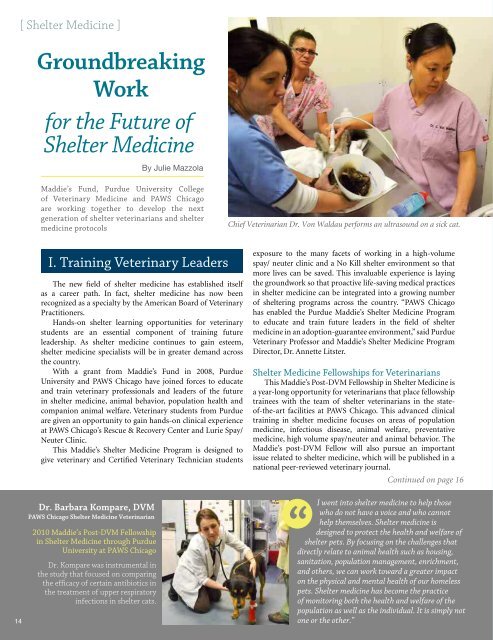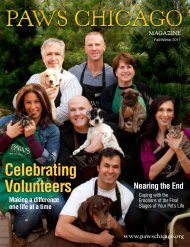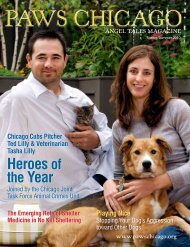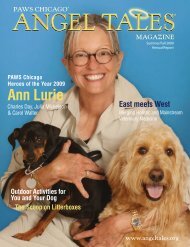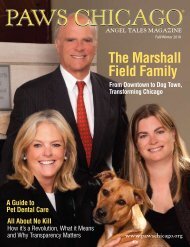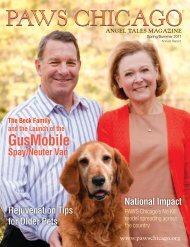DAVID DUFFIELD - PAWS Chicago
DAVID DUFFIELD - PAWS Chicago
DAVID DUFFIELD - PAWS Chicago
You also want an ePaper? Increase the reach of your titles
YUMPU automatically turns print PDFs into web optimized ePapers that Google loves.
[ Shelter Medicine ]<br />
Groundbreaking<br />
Work<br />
for the Future of<br />
Shelter Medicine<br />
By Julie Mazzola<br />
Dr. Jamieson Nichols, DVM<br />
<strong>PAWS</strong> <strong>Chicago</strong> Shelter Medicine<br />
Relief Veterinarian<br />
2009 Maddie’s Post-DVM Fellowship<br />
in Shelter Medicine through Purdue<br />
University at <strong>PAWS</strong> <strong>Chicago</strong><br />
During her fellowship, Dr. Nichols was<br />
involved with the Purdue FIV Study to<br />
produce evidence regarding the clinical<br />
effects of FIV infection, and a study<br />
that looked at vaccination response<br />
times in shelter animals.<br />
Maddie’s Fund, Purdue University College<br />
of Veterinary Medicine and <strong>PAWS</strong> <strong>Chicago</strong><br />
are working together to develop the next<br />
generation of shelter veterinarians and shelter<br />
medicine protocols<br />
Chief Veterinarian Dr. Von Waldau performs an ultrasound on a sick cat.<br />
14<br />
I. Training Veterinary Leaders<br />
The new field of shelter medicine has established itself<br />
as a career path. In fact, shelter medicine has now been<br />
recognized as a specialty by the American Board of Veterinary<br />
Practitioners.<br />
Hands-on shelter learning opportunities for veterinary<br />
students are an essential component of training future<br />
leadership. As shelter medicine continues to gain esteem,<br />
shelter medicine specialists will be in greater demand across<br />
the country.<br />
With a grant from Maddie’s Fund in 2008, Purdue<br />
University and <strong>PAWS</strong> <strong>Chicago</strong> have joined forces to educate<br />
and train veterinary professionals and leaders of the future<br />
in shelter medicine, animal behavior, population health and<br />
companion animal welfare. Veterinary students from Purdue<br />
are given an opportunity to gain hands-on clinical experience<br />
at <strong>PAWS</strong> <strong>Chicago</strong>’s Rescue & Recovery Center and Lurie Spay/<br />
Neuter Clinic.<br />
This Maddie’s Shelter Medicine Program is designed to<br />
give veterinary and Certified Veterinary Technician students<br />
Dr. Barbara Kompare, DVM<br />
<strong>PAWS</strong> <strong>Chicago</strong> Shelter Medicine Veterinarian<br />
2010 Maddie’s Post-DVM Fellowship<br />
in Shelter Medicine through Purdue<br />
University at <strong>PAWS</strong> <strong>Chicago</strong><br />
Dr. Kompare was instrumental in<br />
the study that focused on comparing<br />
the efficacy of certain antibiotics in<br />
the treatment of upper respiratory<br />
infections in shelter cats.<br />
exposure to the many facets of working in a high-volume<br />
spay/ neuter clinic and a No Kill shelter environment so that<br />
more lives can be saved. This invaluable experience is laying<br />
the groundwork so that proactive life-saving medical practices<br />
in shelter medicine can be integrated into a growing number<br />
of sheltering programs across the country. “<strong>PAWS</strong> <strong>Chicago</strong><br />
has enabled the Purdue Maddie’s Shelter Medicine Program<br />
to educate and train future leaders in the field of shelter<br />
medicine in an adoption-guarantee environment,” said Purdue<br />
Veterinary Professor and Maddie’s Shelter Medicine Program<br />
Director, Dr. Annette Litster.<br />
Shelter Medicine Fellowships for Veterinarians<br />
This Maddie’s Post-DVM Fellowship in Shelter Medicine is<br />
a year-long opportunity for veterinarians that place fellowship<br />
trainees with the team of shelter veterinarians in the stateof-the-art<br />
facilities at <strong>PAWS</strong> <strong>Chicago</strong>. This advanced clinical<br />
training in shelter medicine focuses on areas of population<br />
medicine, infectious disease, animal welfare, preventative<br />
medicine, high volume spay/neuter and animal behavior. The<br />
Maddie’s post-DVM Fellow will also pursue an important<br />
issue related to shelter medicine, which will be published in a<br />
national peer-reviewed veterinary journal.<br />
Continued on page 16<br />
I went into shelter medicine to help those<br />
“<br />
who do not have a voice and who cannot<br />
help themselves. Shelter medicine is<br />
designed to protect the health and welfare of<br />
shelter pets. By focusing on the challenges that<br />
directly relate to animal health such as housing,<br />
sanitation, population management, enrichment,<br />
and others, we can work toward a greater impact<br />
on the physical and mental health of our homeless<br />
pets. Shelter medicine has become the practice<br />
of monitoring both the health and welfare of the<br />
population as well as the individual. It is simply not<br />
one or the other.”<br />
“<br />
Learning to look at the<br />
shelter as its own patient is<br />
the area I have learned the most about<br />
at <strong>PAWS</strong> <strong>Chicago</strong>. In veterinary school,<br />
particularly in small animal medicine,<br />
you focus on the individual patient<br />
exclusively whereas in a shelter setting<br />
there is the individual patient but also<br />
the entire shelter population that has<br />
to be viewed as one patient as well.<br />
In keeping with that mindset, having<br />
to adopt a population management<br />
mentality and awareness while keeping<br />
an individual patient focus was an<br />
initial challenge.<br />
A shelter medicine presence is<br />
important for the obvious reason that<br />
a healthy shelter population increases<br />
the rate of movement of cats and dogs<br />
through the system (intake, preventive<br />
care, adoption) and on to their forever<br />
home which in turn makes room<br />
available for other animals to be taken<br />
into the system. But overall, shelter<br />
medicine helps to serve as another<br />
means by which we can improve and<br />
enrich the lives of animals within the<br />
sheltering system today and help the<br />
dedicated people involved in the No<br />
Kill movement create and implement<br />
new ideas and solutions to end the<br />
homeless pet problem that we face.”


